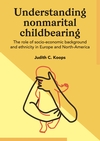In an era of worldwide increasing inequalities, key social science issues about the production and reproduction of social inequality gain renewed attention. A central issue is the role played by demographic events and trajectories in producing and reproducing inequalities. This project examines this issue by studying the relationships between the experience of childhood social disadvantage, demographic decision-making during young adulthood and subsequent economic, social and health outcomes from a comparative perspective.
A limitation of most existing research is that it examined these relationships in a specific society at a specific point in time. The key contribution of this project is the analysis of cross-national variation in the strength of these relationships and its focus on one general explanation: the strength of the relationships depend on the opportunities that societies offer to abate the adverse impact of economic and social deprivation. Testing this ‘contexts of opportunity’ hypothesis will be the key aim of the project. Three aspects of the national context will be analyzed: (1) economic aspects, like the level of economic development and growth in a country, (2) cultural aspects, like the extent to which strong norms on family-related behaviour are operative, and (3) aspects of institutional arrangements, like the openness of the educational system, and existing family policies and general social policies. It will be tested whether the strength of the links between childhood disadvantage, young adult demographic behaviour and subsequent outcomes depend on these three aspects of the ‘contexts of opportunity’.
Retrospective and prospective data from the Generations and Gender Programme (GGP) will mainly be used, and a combination of sophisticated methods, including multi-level analysis, latent variable analysis and sequence analysis. The project will elucidate the role of demography in the reproduction of inequalities and highlight key opportunity structures that influence the strength of the relevant links between social background, young adult demographic behaviour and subsequent outcomes.
CONOPP is funded under the 7th Framework Programme through an Advanced Grant of the European Research Council.
More information on the project is available on the CONOPP project website: www.conopp.com





